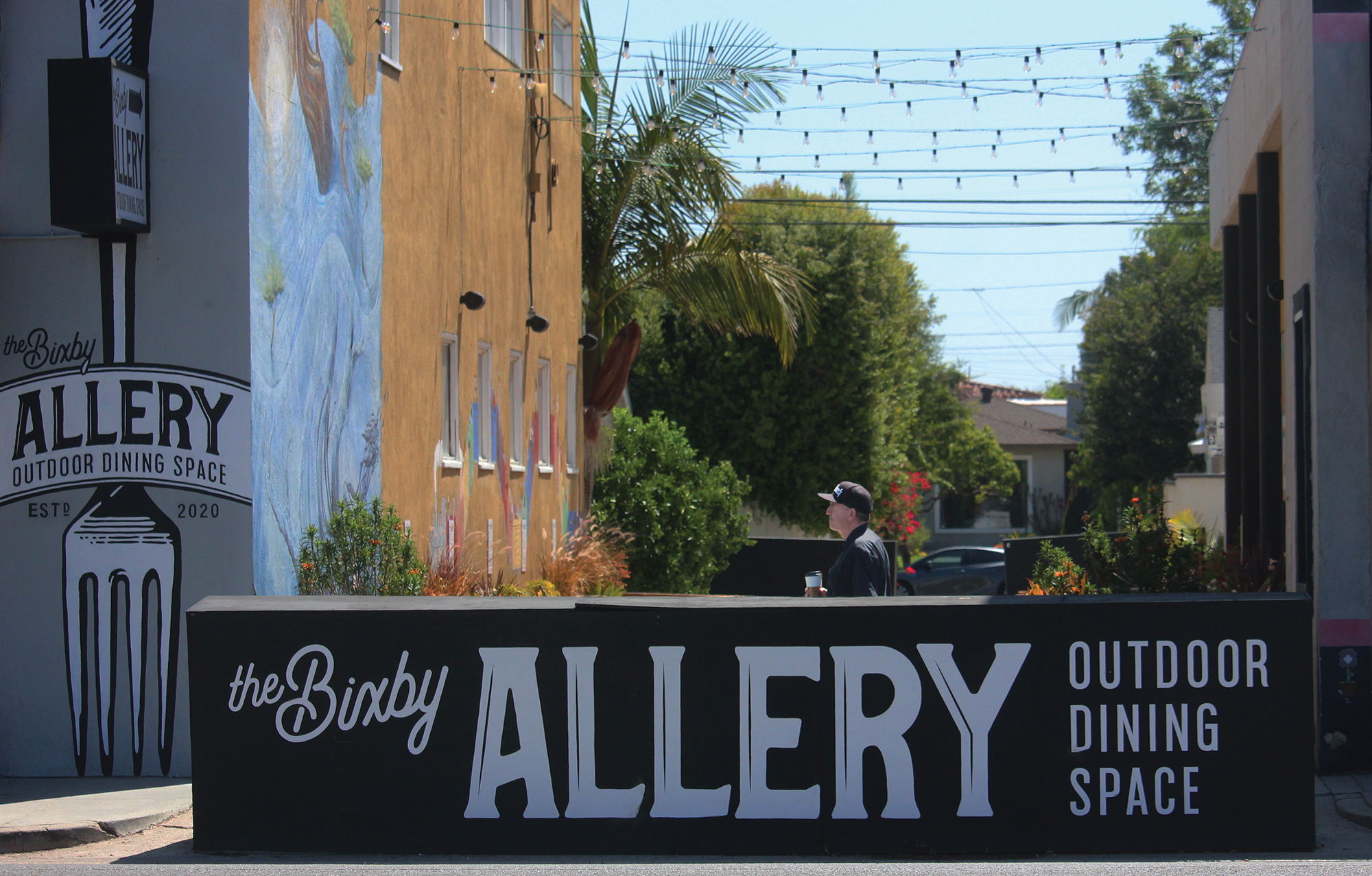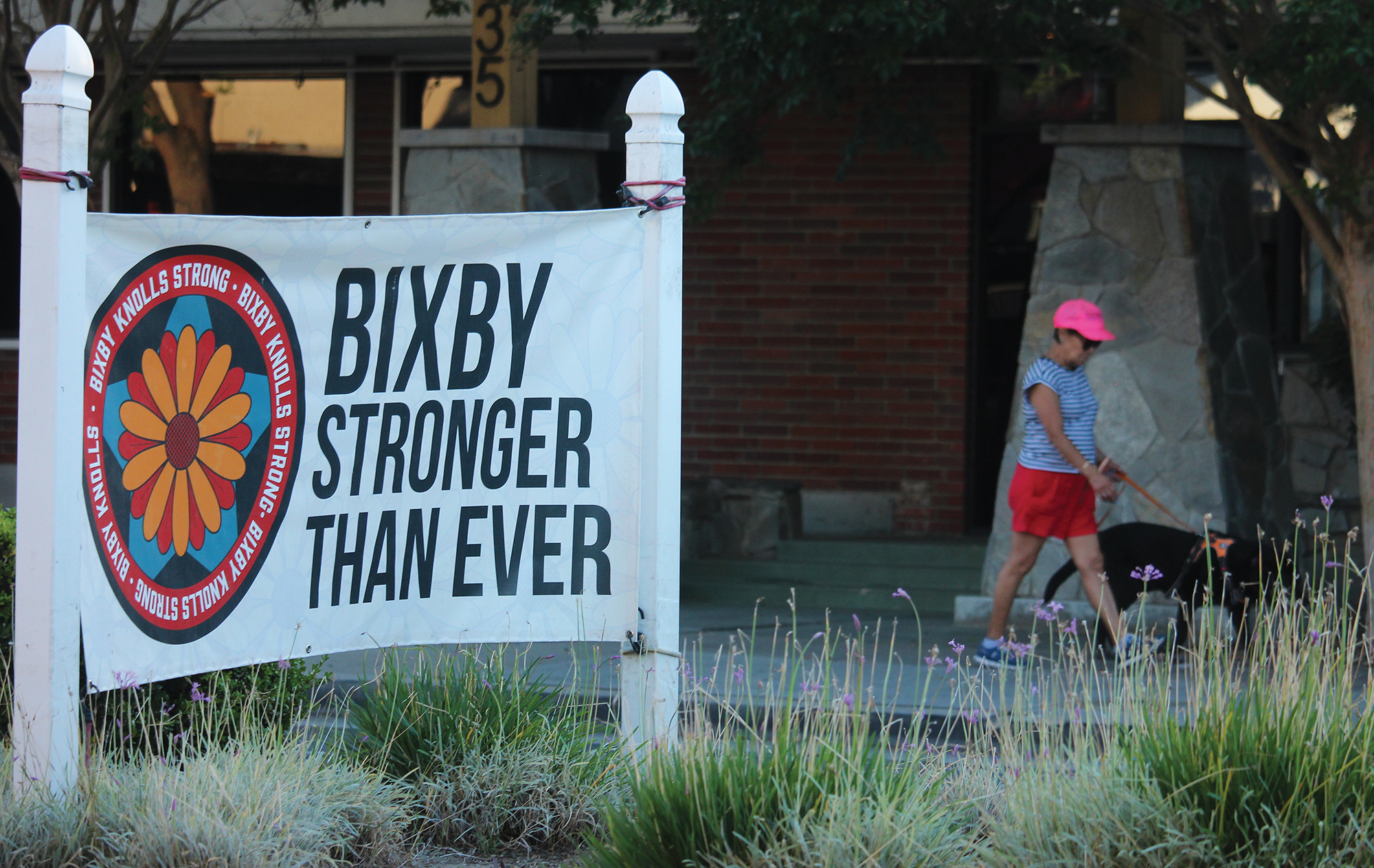
Sporting his usual black hat emblazoned with the words “Long Beach,” Blair Cohn walks the streets of Bixby Knolls on a Wednesday morning touching base with small business owners. He is updating them on plans for an upcoming First Fridays event, the first since the pandemic began.
Cohn, the executive director of the Bixby Knolls Business Improvement Association, winces as he briskly walks across the street, having recently had surgery on his neck. He is dressed in all black, despite the late morning heat, already reaching the high 70s. But connecting with the community is more important to him than his own comfort.
The association pays for a slew of services and events that benefit the neighborhood’s businesses as well as residents. From security to street cleanups and landscaping to events such as First Fridays, the association brings the community together and props up the neighborhood’s businesses. These services, crucial for the survival of the locally owned shops and restaurants, are in jeopardy because the association’s primary funding source is set to dry up this year.
“We have done so much with the funding. What now?” Cohn said. “This is the answer we are working on as the sands of the hourglass continue to empty quickly. We’re at a crossroads.”
When the Long Beach’s Redevelopment Agency was dissolved in 2012, the Bixby Knolls Business Improvement Association had a 10-year contract to receive funding. The association has billed the city for the remaining funds owed for 2021. Once it is paid the roughly $70,000, that will be it, according Cohn.
The annual funding has been used to pay for banners, signage, landscaping, power washing sidewalks, private security, public art, facade improvements and numerous events to promote and support businesses, all with a staff of two or three people.
Many people donated to the association throughout the pandemic, Cohn said, including one anonymous donor who gave $50,000 to “pay it forward.” Cohn and his team took that money, bought large quantities of food from the area’s various restaurants, including MeeMa’s breakfast restaurants, then donated it to health workers, police, COVID-19 testers, vaccine administrators and others.
The association also received $114,000 in CARES Act funding in November and expects additional American Rescue Plan funding from the city next month.
But these are one-time funding sources for extreme circumstances and will not sustain the organization for any length of time.
“We’ve been very creative with what funds are available to us anyway—a lot of smart spending,” interim association board President Norm Cauntay, a certified financial planner with Edward Jones, said. “We’re going to have to get a little bit more creative in how we raise funds. I’m cautiously optimistic.”
After striking out with city officials to identify other revenue sources, Blair and the association board are brainstorming ways to increase funding. One option is to expand the association’s boundaries to include more businesses, particularly those along Orange Avenue. This would bring in more revenue through the annual fees businesses pay, which is currently about $280, or 76 cents per day, Cohn said.
Another thought is the association could increase its annual business fee, which—other than minimal cost of living increases—has increased once in the last 27 years, Cohn said. Other ideas include an annual fundraiser and creating a Bixby Knolls Parking Improvement Area, which would mean additional annual fees for business owners.
Without identifying new funding sources, Cohn said some difficult decisions would have to be made, including whether he could continue as executive director. The association includes Cohn, one full-time staffer and one part-timer but if it reverted to its previous state, that would be a part-time executive director and an answering machine, Cohn said.
“It’d be very bare bones. All this momentum would come to a screeching halt,” Cohn said. “Just give it three weeks and you’d see a physical difference on the street. We’d have a disconnect again … and you might find me at Millikan High School sweeping floors.”

The association’s importance to businesses and the community at large cannot be understated, Miguel Perez, owner of MeeMa’s said. Perez opened his breakfast restaurant in Bixby Knolls during the summer coronavirus surge in July 2020. Operating a new restaurant is always a challenge but the added stress of a global pandemic was almost impossible to overcome. That is, without the assistance of the association, Perez said.
“I don’t think we would have lasted without Blair and the association,” Perez said. “They were crucial in getting the word out about us. Every two weeks, I got a call from him asking what they could do, how they could assist me.”
The association’s events and the food donation efforts were helpful in allowing the community to get a taste of what MeeMa’s had to offer, Perez said, and getting the community talking about the restaurant. If he were to open a second eatery in the neighborhood, Perez said he would need the association to operate exactly as it does now.
“Blair really cares about our existence and that is huge,” he said. “Losing the association would be robbing the community.”
During the pandemic
In the best of times, the association works to support and promote businesses, keep the major corridors clean and graffiti free and bring the community together. When the pandemic set in, Cohn and his small team kicked it into overdrive.
“We spent an entire year in triage mode. The phones would start ringing at 7 in the morning and stop at 11 at night: ‘What do I do? How do I operate? Am I essential?’” Cohn said. “That’s a tough question to answer. You’re talking about someone’s business, them as a person.”
Under normal circumstances, the association hosts in-person events, driving customers to businesses and creating a sense of community. However, the pandemic forced the team to emphasize its presence online. From March 2020 to May of this year, the association sent its membership 400 emails related to resources and guidance updates, shared 562 social media posts and even sent multiple physical letters to every member.
The association hosts numerous recurring social gatherings, such as a walking club, book club and a music club. Cohn was adamant about keeping engagement up for this programming throughout the pandemic no matter what.
For those who were comfortable, the walking club continued to meet every Saturday, masked up with staggered departures for a predetermined route. The music group Knights of the Turntable began receiving weekly curated playlists rather than gathering around and listening to a record. The book club met via Zoom.
In addition to virtual programming, services continued throughout the pandemic, including trash pickups, landscaping and security, all paid for through the association.
“We didn’t want it to look abandoned,” Cohn said. “We didn’t want anything to be overgrown so when people came back … it was in horrible shape.”
Of course, the association could not entirely turn its back on in-person community engagement. Partnering with businesses, the association hosted 11 parades where participants drove through streets, cars decorated, so the residents could watch from their windows, porches and lawns, and stay connected with business owners and each other.
The Halloween parade was six hours long and consisted of a 30-mile route that covered every street in the neighborhood, Cohn said.
“We had to keep everybody engaged with us. If we gave them time to change their patterns enough, it would be hard to get them back,” Cohn said. “So we did as much as we could to beat the drum.”

When allowed per state, county and local health guidelines, the association hosted 53 flash events, often including giveaways, at various businesses to bring in customers. The events were a rousing success, Cohn said, noting that 80% of people would show up for a free item such as a burger but spend money on other items, bringing much-needed sales and brand awareness to suffering businesses.
“But we were not fooled to think that there wouldn’t be casualties,” Cohn said. Some businesses had issues before the pandemic set in, which became insurmountable in the face of shutdowns. Others took the opportunity to retire. “And some just couldn’t make it,” he added.
Businesses that closed as a result of the pandemic include Elise’s Tea Room, FreeSpirit Yoga, Jumper’s Jungle, Averyboo Arts, Recreation Fitness, Payday Advance, Mixx Kitchen, Bixby’s Brooklyn Deli and Georgie’s Place. But it has not all been “doom and gloom,” Cohn said. Bixby Knolls also is preparing to welcome several other businesses soon, including Juice Lab, Sweetgrass, LA Crab, Sal’s Gumbo Shack #2, Blue Burro and Romeo Chocolates.
Like business owners across the country, Bixby Knolls entrepreneurs are getting nervous watching COVID-19 cases and hospitalizations increase, Cauntay said. Many restaurants are watching the news and wondering if new guidelines could move business back to outdoors only.
“I’ve told them they should probably prepare,” Cohn said. “But we can’t go backward completely. We can’t shut down again. It’ll be disastrous. It’d be horrific.”
To offset the negative impacts of the pandemic when only outdoor dining was allowed, the city shutdown one northbound and one southbound lane along Atlantic Avenue and added diagonal parking, which allowed for small parklets and put a buffer between outdoor diners and passing vehicles. For years, Cohn has argued that traffic needed to be slowed along the corridor—be it more traffic lights, a reduced speed limit or lane reduction—so passersby would have time to notice the businesses.
The pandemic caused the opposite. With pedestrians off the street, vehicle speeds through Bixby Knolls increased drastically, and even included dangerous street racing, Cohn said. The lane closures helped curtail that, he said. However, the trial closure was not maintained well due to Public Works being pulled in so many directions, he added.
As it stands, the northbound lane has been reopened and diagonal parking remains on the southbound, which is the opposite of what it should be, as far as Cohn is concerned. He explained that the northbound side has often had a parking shortage, while the southbound side often has spaces available. The future of Atlantic Avenue is just as uncertain as that of the association, Cohn said, adding that Public Works is still considering its options.
Regardless of what happens with the Atlantic corridor or the future of the association, Cohn said he feels he has upheld his commitment to the community.
“People say, ‘Leave it better than when you found it,” and I think we’ve done that,” Cohn said. “But what happens next? I don’t know.”
